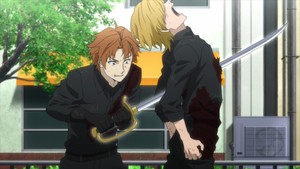
[ad_1]

Old sayings aren’t always right, but in Bungo Stray Dogs‘ world, it seems to be true that no good deed goes unpunished, especially if you’re Akiko Yosano. It doesn’t seem fair or right that she should be blamed for the actions she took as an 11-year-old child forced to participate in a war, and it’s doubly awful that her “crime” was attempting to save someone’s life. Maybe it was, as the soldier said, too kind of her. But how could a little girl understand what that truly meant?
That didn’t matter to someone else who was a child at the time. You may recall that the dead soldier mentioned that he had a brother, and this week is a grim reminder of that fact when Tachihara turns out to be that very person. He blames Yosano, but for what it isn’t clear. For torturing his brother by continually bringing him back from the brink of death? For driving him to suicide? Or for not reviving him that final time? It could be all three, honestly, because like Yosano, he was very young at the time and might not even know what he was more upset about. All he likely processed was that his brother got worse as the war raged on, mentioned Yosano as the “angel of death,” and then one day never came home. It’s a lot to take for an adult; I’m not sure a child could fully sort things out. About all that he really knows is that he blames her, and he’s been waiting for his moment for a long time.
It’s interesting to think about the various people who have served as plants in the Port Mafia. Ango Sakaguchi‘s tenure there brought him in contact with Dazai and Odasaku, and we all know how that ended. Odasaku’s death had a major impact on both Dazai and Ango, shaping their futures in ways that try to fill the hole he left behind. Tachihara, on the other hand, came in already shaped by his brother’s loss, and unlike Ango and Dazai, he chose to fill the void with his anger at and hatred for Yosano.
In both cases, those left behind shaped their lives around their losses, and that’s actually something of a theme for the series as a whole. Look at Hawthorne, who went screaming off the deep end when Margaret was injured, or Kyoka, whose life was shaped by the loss of her parents. In many ways, this story is as much about finding pieces to put yourself back together and deciding what your life is going to look like afterward. Tachihara chose blood and violence, Hawthorne chose anger. They solidify the idea that everything has an equally important flip side, and that, like the Agency and the Mafia, you can’t have one without the other, a theme explored more in the spin-off Beast.
As far as this episode goes, it’s clear that the Hunting Dogs exist in their own special category. They come across as both self-righteous and unhinged, as if their actions are completely excused by their reasons for doing them. It’s different than Dostoyevsky’s groups, because he clearly delights in sowing chaos, and the Mafia also has its own understanding of its dark nature. But the Hunting Dogs don’t appear to care to think about the whys of what they’re doing, they’re just willing to do. If anyone stopped for half a second to think they’d see that the Agency is being set up, but that doesn’t matter to the Hunting Dogs. They have a job. They’ll just do it, and if it coincides with one of their members’ personal goals, awesome. That’s just the icing on the cake.
At least we know that Fitzgerald hasn’t betrayed the Agency and that Yosano was able to save Margaret before everything went even more to hell. I’m not sure how Margaret’s Skill could help, but Fitzgerald has eyes everywhere. Here’s hoping he uses them.
Rating:
Bungo Stray Dogs Season 4 is currently streaming on
Crunchyroll.
Disclosure: Kadokawa World Entertainment (KWE), a wholly owned subsidiary of Kadokawa Corporation, is the majority owner of Anime News Network, LLC. One or more of the companies mentioned in this article are part of the Kadokawa Group of Companies.
[ad_2]





